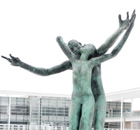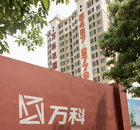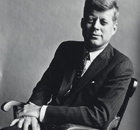Comment
For whom the bell tolls
(China Daily)
Updated: 2010-04-13 08:22
 |
Large Medium Small |
|
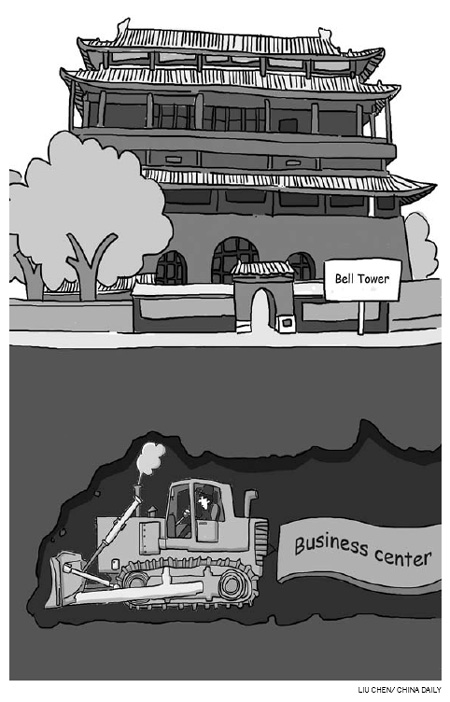 |
Many of these stories sound incredible because of the numbers involved, and their scale usually numbs my emotions.
But when I heard about the Drum and Bell Towers project, I grew angry.
If you don't know the details, it refers to how the two these historical and impressive timekeepers in Guloudajie might get a dazzling makeover.
Apparently, a government investment of 5 billion yuan has been set aside to convert 12.5 hectares of land, both above and below ground, into something dubiously called a "Beijing Time Cultural City".
Exactly what this wonderland will include is not known, but no doubt it will house a museum and - because they are in such short supply - a shopping mall or two.
If rumors are anything to go by, there will be a massive plywood casing built around the Bell Tower to update its image into something like a chunky Big Ben.
The bell will be rung manually each hour except midnight (since it's hard to ring a zero), and at noon each day a local talent will bellow Oranges and Lemons from the spire.
The reason I am angry is because I love this section of Beijing.
It is the root of many positive memories for me, and the backdrop to a caf culture I first encountered last summer. I don't want it to change, but more importantly, I don't understand why it should.
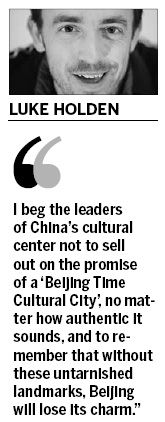
Around the same time, my work pushed me to research the history of Emperor Yongle and his role in the construction of Ming Dynasty architecture, including the Forbidden City, the Temple of Heaven, and the Drum and Bell Towers.
I learned that the Bell Tower is significant because Chinese tradition states every city should have a bell tower.
Yongle moved the capital from Nanjing to Beijing in 1421 and as an indication his decision would never be undone, renovated an older structure to hold the largest and heaviest bell in China.
So it seems horribly fitting that what once was an indicator of the strength of the capital might become an indicator of the capital's current strength - the local government's thirst for money.
Why is it that historic monuments in the capital are continually enslaved to earn?
I was here when the Silk Street Market stopped being a street, when Qianmen updated its secretive back alleys into something resembling a Western movie set, and recently, when the former palace of Emperor Qianlong's mother, next to Beihai Park, was advertised online as office space.
It's my opinion that local authorities are trying to change this city too quickly in a wild grab for cash.
I cannot possibly fathom why a shopping center, or even a museum, would improve the appeal of the Bell Tower.
Anyone who wants to come will do so regardless of whether they can buy cheap technology and bell-shaped erasers.
You don't need to be a genius to see that money is what drives the authorities forward, with the focus strictly on profit rather than sustainability, and I suspect that much of it will line the pockets of anonymous black Audi passengers.
So I would like to ring a bell of warning about this next step toward glitzy commercialization and shout loudly that it will only end in pure sleaze.
I beg the leaders of China's cultural center not to sell out on the promise of a "Beijing Time Cultural City", no matter how authentic it sounds, and to remember that without these untarnished landmarks, Beijing will lose its charm.
Stop before you can't go back.

